What was life in Bomber Command like? 100-year-old veteran Bill Purdy remembers
Bill Purdy fought through the most dangerous theatre of WWII as a pilot with Bomber Command. Every time he took off for Germany he stood a 10 per cent chance of not making it home.
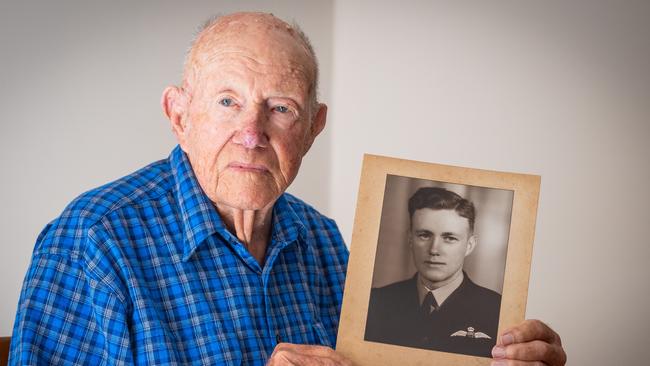
Every time young Bill Purdy sent a letter home to his mum, he told her how nice the English countryside was, and that where he was based during World War II was quiet and peaceful.
In reality, Mr Purdy was a pilot with Bomber Command, the most dangerous theatre of the war, and he stood a 5-10 per cent chance of not making it home every time he took off for Germany.
At the same time as he was writing to his mum telling her how quiet his posting was, Mr Purdy was writing other, more truthful letters. Before every mission, he wrote or updated his last letter, a note to be sent home to his family in the event he didn’t make it back at the end of each evening’s operations. Thankfully, they never had to be posted.
Now aged 100 years, Mr Purdy remembered his parents didn’t know he was a pilot with Bomber Command until after his tour of duty had finished.
INTERACTIVE SPECIAL: 66 MINUTES OF HELL
“They didn’t find out until there was a little article in the local paper about my bomb aimer who happened to be a horse trainer,’’ he told The Australian.
“It actually happened about two days after we finished our tour. Up until then I used to write nice little letters to mum telling her what the countryside was like in England and how nice it was to be there, quiet and peaceful, all the usual stuff that you write about.
“I didn’t tell them. It was ‘Dear Mum. Everything’s okay. Love your son Bill.’ And that was about it.’’
Mr Purdy is one of 125,000 airmen – 10,000 of them Australian – who took part in the air war bombing the Nazis in World War II. While 55,000 of his comrades, including around 4100 Australians, never made it home, he survived 37 missions, piloting a Lancaster to attack Germany.
-
“The moment you joined Bomber Command your thoughts of living much longer were a bit bleak,’’ he said.
-
“People were shooting at you. You got used to it. If you didn’t, you’d go mad I guess.’’
He enlisted in the Royal Australian Air Force in 1939 and did basic training in Australia before being sent to the UK to join the war there.
“It was pretty much par for the course that you would end up at Bomber Command because that’s where all the losses were taking place,’’ he said.
66 Minutes of Hell
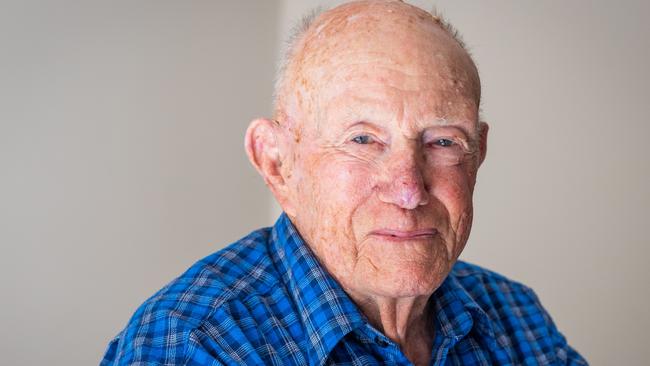
‘Your thoughts of living much longer were a bit bleak’
Bill Purdy fought through the most dangerous theatre of WWII as a pilot with Bomber Command. Every time he took off for Germany he stood a 10 per cent chance of not making it home.
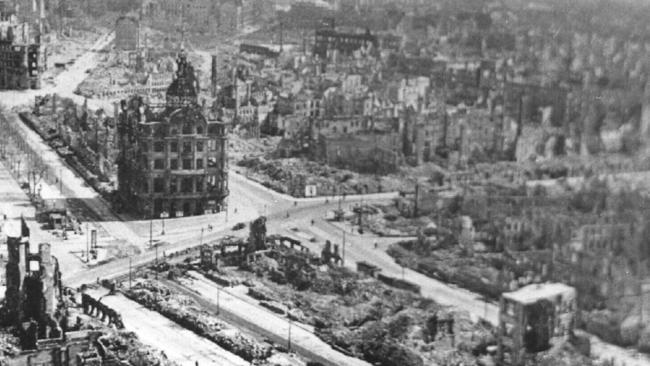
How Bomber Command was airbrushed from history
Politicians cancelled the important role Bomber Command played in WWII after a devastating attack on the city of Dresden which killed 25,000 people.
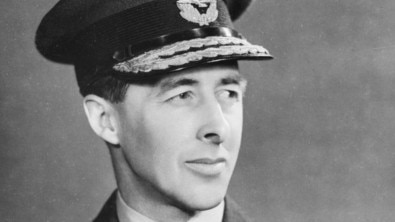
Little-known Aussie became one of the great wartime leaders
‘Brilliant’ Queenslander Don Bennett’s pivotal role with the Bomber Command’s Pathfinders made him one of the Allies’ greatest leaders of World War II.
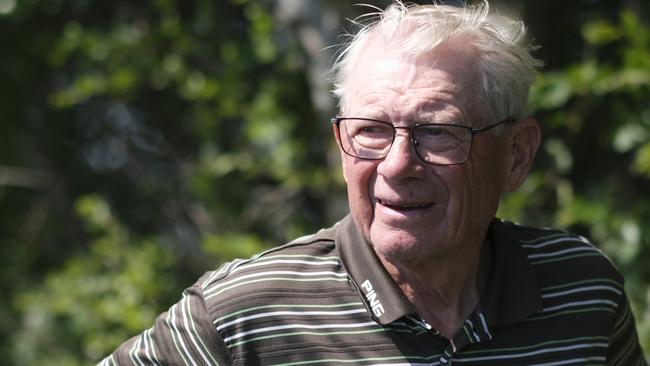
Danes can never forget Aussie airman’s ultimate sacrifice
Sigurd Sørensen was only seven years old the night Aussie pilot Norm Cooper’s plane went down. The force of the explosion blew out the windows of his family’s farmhouse.
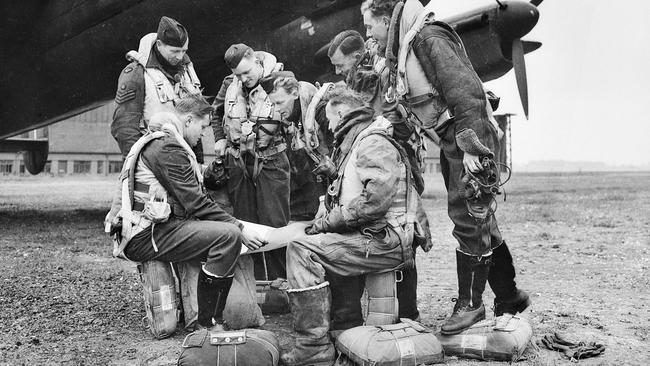
Radical radar breakthrough helped defeat Nazis
Six Bomber Command crews were reportedly ‘thrilled with our new toy’ but despite having a wartime technological marvel on-board none of their planes survived.
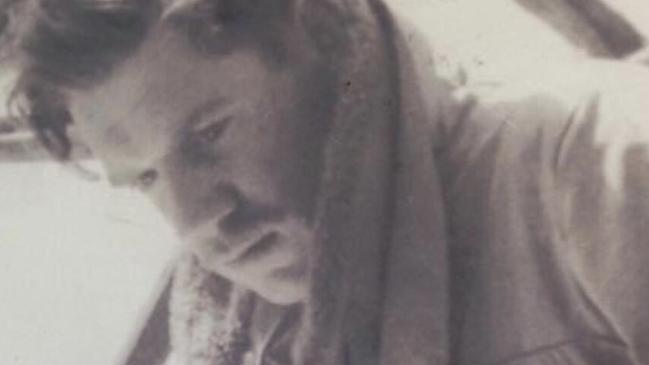
WWII hero with a compass hidden in his comb
Australian airman Alan McCormack survived being shot down over Denmark, a plunge into the frozen Baltic Sea, and a brutal prisoner-of-war camp, to make it to freedom.
He didn’t take much notice in the early days of how dangerous his posting would be.
“We were too young to even think too much about it at that stage. You only start to think about it once you’re actually there and you were actually in the air and someone was actually shooting at you.’’
Mr Purdy marked his 21st birthday flying over Munich in April 1944 and completed his tour in 1945. Many of his colleagues were not so lucky.
“I lasted, which was nice,’’ he said.
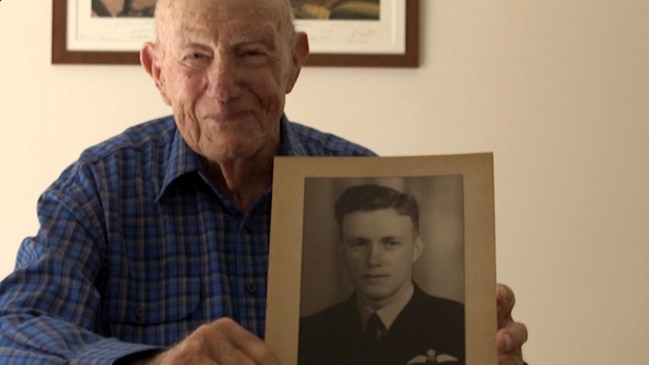
“When I finished my tour one of my ground crew said to me, ‘look, I must tell you this, you were the only person to finish a tour of operations on G for George which was my aircraft.’’ (G for George was a common name across the squadrons, and passed on when an aircraft was lost.)
“Every time I went on leave someone else would take my aircraft and wouldn’t come back. So I always came back to a brand new shiny Lancaster.’’
Mr Purdy flew for the Australian squadron 463, based out of Waddington, in Lincolnshire.
“We had two Australian squadrons on the same base and that was squadron 463 and 467,’’ he said.
“At that stage of the game Lincolnshire was just one massive Bomber Command place, I think we had seven bases there at one stage.’’
The death toll was so high among Bomber Command, Mr Purdy, like many others, kept emotional distance from other members of the Command who were not part of his seven-man crew.
“We were all like that, I’m quite sure,’’ he said.
“We never got close to anyone in the squadron apart from our crew because you lived or died with them.
“That was about it.
-
“If you got too friendly with anyone there, the odds were they wouldn’t come back and that was a bit of a blow to you.
-
“It was easier, you were always friendly but you didn’t get too close.
“The other bed in my room was actually occupied by six other people who just came and went,’’ he said, referring to the room-mates who were killed during the period of his tour.
Mr Purdy never had to bail out of his aircraft, although he was shot up several times, and on one occasion limped home with a badly damaged aircraft full of holes after being hit over France.
“It was almost fatal for us,’’ he recalled.
Regardless, he was superstitious about talking too much about narrow escapes, so told the intelligence officer debriefing him that the flight was “uneventful.’’
“We were hit several times,’’ he said of his 37 operations.
“That was par for the course. There was nothing you could do about the anti-aircraft fire because they just kept on shooting up at you.
“We went in and bombed and turned around and came home. It was all too busy at that stage of the game to even feel frightened about the whole thing.’’
Mr Purdy flew Lancasters at the rank of flying officer, then became a flight lieutenant, before being promoted to a squadron leader. He held that rank for just 24 hours before it was decided he would be transferred back to Australia to convert onto the Liberator aircraft to fight the Japanese.
“I was a one-day squadron leader,’’ he said.
He began making his way back to Australia, and took a short period of leave before preparing to take on his new role fighting in the Pacific.
But the war ended before he needed to get into the air again.
“They’d dropped the big bomb, so that was it,’’ he said, referring to the nuclear bombs dropped by the Americans on the Japanese cities of Nagasaki and Hiroshima in August 1945.
He was approached in September 1945 to ask if he wanted to continue with the air force in Australia.
“I said ‘no thanks I’m out of here’ and four days later I was back where I used to be, I worked for a wholesale grocer.’’
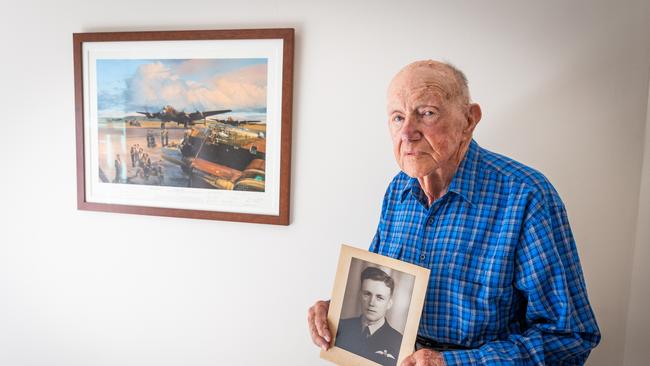
Mr Purdy built a strong career in the grocery industry, and eventually became the chairman of the Arnott’s biscuit company, before retiring 30 years ago at the age of 70.
He met his sweetheart Margaret after the war, and they married and had a son and daughter.
Margaret passed away 14 years ago.
“I try to keep busy, I think that’s the way to keep on living, just have something to do,’’ Mr Purdy said.
He lives independently, does his own shopping, drives his own car, and plays golf twice a week and bowls twice a week. He is recuperating from a broken pelvis sustained in a fall, but is sick of resting up and keen to get back to his normal active life.
In 2014, he flew a Tiger Moth cross country, and until a few years ago would drive to Bankstown Airport, rent a plane and practice landings and take off for a few hours “just to keep my hand in.’’
Mr Purdy said those who did not take part in the war could not understand how bad it really was, and that he had “no idea’’ how he had maintained his physical and mental health.
“It was pretty bad, while you were in it,’ he said.
“(But) the alternative to complaining about your problems in Bomber Command was you would be nominated as LMF, which stands for ‘lack of moral fibre’.
“They didn’t take you out and shoot you but I never found out what happened to the fellows because we had a couple who just gave it up.
“Some were terrified. We were all frightened at some stage of the game but you just pressed on and did what you had to do.’’

To join the conversation, please log in. Don't have an account? Register
Join the conversation, you are commenting as Logout